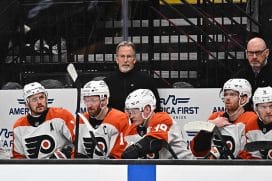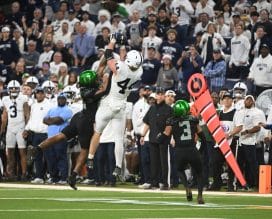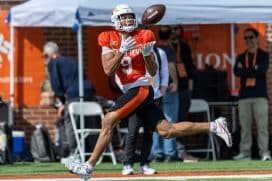Flyers
Series in Review: Flyers-Sabres 1975
By Kevin Durso, Sports Talk Philly editor
As we hit the homestretch of the Series in Review, it’s time to look back on the two greatest series in Flyers franchise history, the only two that have ended with the Stanley Cup being awarded to the Flyers.
Today, we will look at the second of the two Cups.
The Flyers were the defending champions and after defeating the heavily-favored Bruins a year earlier, had started to earn the respect of the league and were a more likely choice to defend when they went through the playoffs, first sweeping the Toronto Maple Leafs, then managing to avoid being on the wrong side of history, defeating the New York Islanders in seven games after taking a 3-0 series lead.
That left the Buffalo Sabres as the final opponent for the Flyers in 1975, and it was a series that was certainly close and featured some storied moments.
Here is a look back at the 1975 Stanley Cup Final between the Flyers and Sabres.
Game 1: Flyers 4, Sabres 1
Unlike the 1974 Stanley Cup Final, the Flyers started the series on home ice for the first two games. It took until the third period for either team to find the net, but finally at 3:42 of the third, Bill Barber got the Flyers on the board.
Ross Lonsberry added a power-play goal at 7:29 to extend the Flyers lead, but a goal by Rick Martin on the power play got Buffalo on the board at 11:-7. Just 34 seconds later, Bobby Clarke scored on the power play to restore the two-goal lead and Barber added his second goal of the game with 58 seconds remaining to seal the Game 1 win.
Game 2: Flyers 2, Sabres 1
Similar to Game 1, it took some time before either team was able to score in Game 2. It finally happened for the Flyers at 8:24 of the second period when Reggie Leach opened the scoring.
Early in the third, the Sabres tied the game with a goal by Jerry Korab at 2:18. Another power-play goal for the Flyers put them in front for good as Clarke scored at 6:43. That would be the game-winning goal as Bernie Parent shut the door the rest of the way, making 18 saves in the Game 2 win to give the Flyers a 2-0 series lead.
Game 3: Sabres 5, Flyers 4 (F/OT)
The series shifted to Buffalo for Game 3 and it proved to be a game that would go down in history. It is now known as the “Fog Game.” The Buffalo Auditorium did not have an air conditioning system and due to unusual heat in Buffalo in May of 1975, it had an effect on the ice, creating a heavy fog that left players unable to see more than just a few feet in front of them.
Additionally, another strange occurrence happened during this game. A bat appeared in the arena, flying above the rink and around the players. Finally, Sabres forward Jim Lorentz hit the bat with his stick and killed it.
As for the game, it was the highest-scoring affair of the series. Just 39 seconds into the game, Gary Dornhoefer scored for the Flyers and Don Saleski added a goal at 3:09 to make it 2-0. Just when it looked like the Flyers were on their way again, Danny Gare and Martin scored 17 seconds apart to tie the game at two. Rick MacLeish added a goal at 14:13 of the period to give the Flyers a 3-2 lead.
Don Luce opened the scoring just 29 seconds into the second to tie the game at three. Leach gave the Flyers the lead again late in the second with a goal at 14:30.
The only goal of the third period came from Bill Hajt at 9:56, tying the game at four. That forced overtime and with just 1:31 remaining in the first overtime, Rene Robert scored the deciding goal to give the Sabres their first win of the series.
Despite allowing five goals, Parent was stellar through the dense fog, making 41 saves in the defeat. The Flyers finished the game with 33 shots on Buffalo netminder Gerry Desjardins.
Game 4: Sabres 4, Flyers 2
Again in Game 4, the Flyers got off to a fast start. Andre Dupont scored at 11:28 to open the scoring with the only goal of the opening period. Korab scored to tie the game on the power play at 3:46 of the second, but Lonsberry scored 34 seconds later to put the Flyers in front again.
Gilbert Perreault struck for his first goal of the series on the power play at 10:07 to tie the game. Lorentz scored at 15:07 to give the Sabres the lead.
Though the game remained close into the final minutes, the Flyers could not solve Desjardins and the Sabres iced the game with a goal by Gare with 32 seconds left to seal a 4-2 decision and even the series up at two games apiece.
Game 5: Flyers 5, Sabres 1
Back on home ice, the Flyers were determined to not let the early advantage they had in the series get away, and they returned to dominance with a convincing effort.
First-period goals from Dave Schultz at 3:12, Dornhoefer at 12:31 and Bob Kelly at 12:50 set the tone for the game.
The Flyers added two more goals in the second period from Leach on the power play at 1:55 and Schultz at 9:56 to cap their end of the scoring.
Parent was nearly perfect as well, allowing just one goal to Luce at 14:02 of the third period. He stopped the other 23 shots he faced as the Flyers moved to within one win of their second consecutive Stanley Cup.
Game 6: Flyers 2, Sabres 0
The Sabres had shown they could have success against the Flyers on home ice already in the series, and they certainly gave their best effort in Game 6. This was one of their more productive shooting games, taking 32 shots in the game and really peppering the Flyers goal at times.
For the second straight Game 6 in a Stanley Cup Final, Parent was superb, standing up to every shot as the game entered the third period without a goal.
Just 11 seconds into the final period, Kelly scored to give the Flyers the lead. Just as it had a year before, the lone goal held up for the majority of the third period. The only difference from the 1974 Cup clincher was a late insurance goal that essentially sealed the result with a few minutes to spare. It was Bill Clement scoring with 2:47 remaining to make it a 2-0 game and finishing off the series for good. Parent finished off the shutout and the Flyers had won the Stanley Cup for the second year in a row.
This series speaks to the depth and the skill that some of the Flyers feistier players had. Barber and Clarke helped pace the Flyers offense in the first two games. In the last two games, it was guys like Schultz and Kelly and Dornhoefer that really helped them complete the series win.
But really, the series was all about Bernie and speaks to his greatness.
In the series as a whole, Parent allowed 11 goals total over the six games. As if a 1.83 GAA for the series wasn’t enough, Parent allowed eight of those goals in Games 3 and 4 in Buffalo. On home ice in the series, he allowed just three goals in three games. Of course, the shutout in Game 6, the second straight to seal a Cup-clinching win, was the real topper.
Parent’s 1975 playoffs is something that may never be replicated again. In 15 games, Parent had a 10-5 record while posting a 1.89 GAA and .924 save percentage, including four shutouts. He easily took home the Conn Smythe Trophy for the second straight season, becoming the first player to win it in back-to-back years.
While those numbers may not longer be realistic in today’s game, it is the type of performance that the Flyers have been trying to replicate for years, having the right goaltender in place to be able to carry the team through the toughest times in a game and keep the team afloat.
It’s not like the Sabres were a poor team. Certainly, the Flyers had reached the NHL’s peak a year before and were now favored in a series against another expansion team — the first Stanley Cup Final to feature two expansion teams. The French Connection line of Robert, Perreault and Martin was lethal, with all three players posting 95 points or more in the regular season. Martin had 52 goals that season. Robert had 40 goals and 100 points.
The Sabres certainly made the series more interesting than it appeared it was going to be after the first two games with the pair of wins in Buffalo. But by the time the series reached Game 5, the Flyers outlasted the Sabres and had more left in the tank for the final two games to finish off the series.
Tomorrow, we will conclude our Series in Review with a look back at the 1974 Stanley Cup Final.





